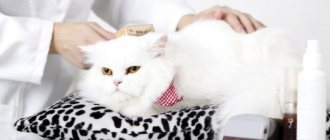Cats have their own tastes and preferences. Many pet owners have noticed that they are lovers of certain foods. While cucumbers and fruits are only consumed by some animals, there are some plant foods that most cats love. And you guessed right - the most common among the mustachioed and fluffy ones are lovers of olives (olives).
So why do cats love olives? Of course, the furry friends themselves cannot yet tell us why they have such a preference. Perhaps in the future people will learn to recognize cats' language and ask them directly. But so far there are several opinions on this matter.
Benefits and harms for cats
Veterinarians advise that before giving olives to your pet, evaluate the pros and cons of the herbal product, which are described in the following table:
| Positive effect from use | Negative aspects of including olives in the diet |
| Saturation of the body with vitamins and microelements | High content of salt, spices and vinegar in canned food |
| Blackening olives with dangerous additive E579 | |
| Replenishment of energy reserves | Increased load on the heart muscle |
| Kidney dysfunction | |
| Improved mood | Increased risk of cardiac ischemia |
| Increasing diet diversity | Water imbalance |
| Risk of aggression and loss of strength |
It is strictly forbidden to give your pet such stuffed products.
Eating canned olives, which take longer to marinate in vinegar and preservatives, is especially dangerous for cats. According to veterinarians, even a single consumption of 2-3 fruits can cause gastrointestinal upset in a pet. The most common negative symptoms include vomiting, pain in the abdominal area, internal inflammation and rash of allergic etiology. Store-bought olives stuffed with fish or meat fillings are strictly prohibited, as they contain artificial flavor enhancers and gelatin.
If your pet really asks for an olive, then it is better to give him olive oil, which cats love as much as canned fruits. It does not cause harm to health and improves the functioning of the gastrointestinal tract.
To minimize the risk, if there is no desire to exclude olives from the animal’s diet, it is better to give preference to fresh green berries. Observations of cats confirm that they even show interest in tree bark. The maximum permissible dose is 1 olive. The bone must first be removed. If a cat eats olives constantly and experiences a narcotic effect from them, then they need to be removed from the menu. If there are signs of poisoning or overeating with olives, you should show your pet to a veterinarian and induce a gag reflex. To restore water balance and quickly remove toxins, bowls of clean water should be placed next to the cat. You may need to force liquid into your mouth through a syringe without a needle.
Benefits of fruits for cats
Very often, such a tasty and healthy delicacy as olives is purchased for the holiday table. However, not everyone knows that they are the same fruit. At the same time, many manufacturers usually sell colored or marinated fruits of the olive tree under the guise of olives. And olives are just canned green berries. But thanks to fewer chemical additives, the benefits of green fruits are somewhat greater.
shutterstock
The main benefit of the fruits of the olive tree is that olives contain the following components necessary for the body:
- Vitamins A, C and E;
- Potassium;
- Sodium;
- Iron;
- Phosphorus;
- Iodine;
- Vegetable fats;
- Cellulose;
- Unsaturated fatty acids.
Vitamins C and E, when entering the body of cats, help eliminate free radicals, thereby preventing the development of a large number of pathologies, including cancer. And the fiber that olives are rich in cleanses it of toxins and cholesterol. Considering that the incidence of heart disease in cats is high, these fruits may benefit them. Phosphorus, which olives contain, is necessary for cats not only for strong bones and teeth. This element is involved in the process of converting nutrients such as fats and carbohydrates into energy. Without it, the cat will be lethargic.
The benefits of olive oil for pets are no less than those of whole fruits. It helps improve vision and digestion, and also strengthens the animal’s bones and cartilage. Thanks to this, the cat is especially cheerful and resilient. Another unique feature of olive oil is that when heated it does not oxidize and practically does not change its properties. Therefore, in small quantities it can be safely added to food if cats like olives.
What about Omega-3 and Omega-6 fatty acids?
Unlike their owners, cats cannot absorb beneficial substances from vegetable oils, including the “magic” Omega-6 and Omega-3 polyunsaturated fatty acids, by the way, the latter - eicosapentaenoic acid (EPA) and docosahexaenoic acid (DHA) - are practically there No.
These substances, necessary for our domestic predators, are contained only in the fat of marine fish; in addition, it is thanks to animal, and not vegetable fat, that cats receive energy for an active life. So in nature, their goal is to catch a thicker mouse, and not to gnaw on a ripe sunflower.
The answer to the question, is olive oil ok for a cat?,
who eats ready-made food - an even more categorical “no”. Everything an animal needs for a full life is already in the diet. An extra product on the menu will lead to an imbalance and will not contribute to the cat’s health in any way.
The same can be said when discussing whether a kitten can have olive oil. By adding vegetable fat to your baby's first complementary foods, you are not helping him in any way, you can only provoke an upset of the delicate digestive system.
Harm
Many people mistakenly believe that four-legged animals do not eat things that are harmful to them. Unfortunately, it is not. Everyone watched how deliciously they ate sausages or smoked sausage, which were clearly unhealthy for them.
Not healthy but tasty!
The brine contains salt and vinegar, which are contraindicated for animals. Salt retains fluid in the body and promotes swelling. Vinegar irritates the stomach lining. When preserved, the amount of nutrients is reduced by almost half. Manufacturers are developing new recipes, adding fillings to olives. Which are not always suitable for consumption by a pet. The anchovies indicated in the composition can be easily replaced with minced fish produced using sodium derivatives. This composition cannot be called useful. Your pet's strange behavior after eating something exotic can be funny, but don't forget that this is not typical for him. More reminiscent of the consequences of drug use.
Ripening is expensive, and chemistry often comes to the aid of industrialists. With the help of certain additives they make the product “blacken”. It is very rare to find truly ripe ones. And they should cost much more. If the product contains E579, it is better to refuse the purchase.
What are the dangers of grape berries for dogs?
Grapes were officially recognized as dangerous for dogs in 1989. And the Animal Toxicology Center at the international organization ASPCA during 2003-2004. recorded 140 cases of poisoning of these animals by grapes. Half of them developed severe renal failure, and 7 animals died. The breed, age or gender of the dog did not affect the risk of developing poisoning.
Despite numerous studies, a substance that has a toxic effect on the dog’s body has not been identified. The assumption that the cause of intoxication is pesticide residues on the surface of the berries was not confirmed - clean, untreated grapes have the same nephrotoxic effect. The hypothesis that the cause of poisoning is grape seeds containing large amounts of organic acids has not been confirmed either. Firstly, these fruit kernels are not digested in the dog’s stomach, and secondly, seedless grape varieties act on the dog’s body in the same way as varieties with seeds.
Today, scientists are inclined to think that it is not a specific element of grapes that leads to toxicosis, but their combination in high concentrations. As you know, grapes contain many vitamins, micro- and macroelements. These nutrients include nitrogen, calcium, copper, manganese, phosphorus and calcium. A sharp increase in their level in the body can cause general intoxication in canines. Apparently, these substances, useful in microdoses, act like poison in a loading dose.
Judging by the symptoms, the digestive system is the first to be affected: the dog begins vomiting with remnants of undigested berries and severe diarrhea. For some time, the kidneys try to neutralize and remove toxins, but then the animal develops autointoxication syndrome. This leads to the accumulation of metabolic products in the blood and disruption of all types of metabolic processes.
Dried grapes - raisins - are considered several times more dangerous for dogs than fresh ones. For a medium-sized dog to be poisoned, it is enough to eat a dozen fresh grapes; just 3-4 raisins are an equally dangerous dosage.
Why cats love olives
Cats are carnivores by nature, their usual diet is meat. Under natural conditions, cats hunt small rodents, frogs, lizards, and fish. But the body needs vitamins, then cats diversify their menu by eating grass and leaves.
At home, the pet receives the necessary substances with food. But natural instinct forces animals to try new food.
Researchers have discovered the reason why cats love the fruits of the olive tree:
- Smell. The fruit contains isoprenoids; their effect on the cat’s body is similar to the active substances of valerian. When eating or sniffing olives, the areas of the brain responsible for managing emotions are stimulated. But, unlike valerian, the euphoria from olives lasts 10-15 minutes and does not harm the animal’s body.
- Taste. Brine and canned olive berries have a pleasant sour taste that cats like.
Interesting: cats react not only to olives, but also to olive oil, as well as to dishes that contain it. Some animals even react to creams with this ingredient: they begin to lick the skin of the owner’s hands and rub their faces.
Be sure to read: Why cats rub their faces against their legs: reasons, wean or encourage, what the consequences may be
Why olives attract mustachios
Many cat owners can surprise you with stories about their pets’ unusual eating habits. Some animals adore fresh cucumbers and are not averse to picking them from the garden themselves (read the article on how to wean a cat from eating cucumbers from the garden). Others always hang around the kitchen table when the owner opens a jar of canned peas, corn or mushrooms. There are also lovers of raw potatoes, plums, and bananas among the baleen-striped ones.
The adoration of olives and olives deserves special attention. Many owners have cats running wild when they hear the click of a can opening. And having received the fruit, they begin to play with it, chase it around the floor, lick it, sometimes the “toy” is eaten with appetite.
Reaction to olives.
And many cat owners confirm that their pets react to olives like they do to valerian:
- “He starts screaming like crazy”, “he’s ready to do anything for one olive”, “having smelled olives, he’s already shaking” - such phrases can be read on various forums of cat lovers.
- Some purrs play with the fruit, eat it, and then roll around in the place where this action took place.
- And especially characteristic pets are ready to rush into battle for their favorite treat! Including with your beloved owner.
But this “strange” behavior quickly passes, and the cat returns to normal. In addition, not all pets show such a violent reaction to olives.
What is attractive about fruits? In the wild, felines, like other carnivorous animals, feed mainly on meat. This is the basis of their diet, containing the necessary component - animal protein. Cats hunt birds, fish, rodents, frogs and even insects. They get some vitamin elements from grass and leaves.
Domesticated cats eat what humans offer them; many owners prefer to feed their pets balanced ready-made food. Typically, commercial diets include all the necessary elements that a cat’s body needs, but most cats love to try something new and tasty:
- Thanks to their natural instinct, cats never stop searching for new taste sensations. Not a single representative of the feline species was harmed due to curiosity.
- In the process of research, we managed to find out that cats like the sourish olive taste. That’s why they are so attracted to canned foods like olives.
- Intense aromas cause acute reactions in cats. The peel of the olive tree fruit contains a number of essential oils that can act as hallucinogens in some animals.
There is still no exact answer to the question of why some cats love olives. The situation is complicated by the fact that animals react differently to such a delicacy. Some pets turn their nose up at such treats, others limit themselves to active games, without subsequently eating the toy.
On a note
There are many known cases when a cat jumped onto a festive table and turned everything upside down in pursuit of an olive. Olives are mainly in a marinade, so it is necessary not to give them to your pet very often, since they are a canned product, and the vitamin content in them is colossal for the body of cats and humans.
We already know that this is due to the high content of vitamins and nutrients in olives; this product not only has a good effect on the cat, but also on humans. If you eat a few olives every day, you can completely forget about many diseases, remaining young and beautiful.
If you eat 20 olives with pits in a month, you can avoid kidney and bladder stones, gallstones and dental stones will not form. The functioning of the intestines will improve like clockwork. Cats can eat turnips, radishes, radishes. Cats go as crazy from canned sweet corn as from olives.
Persimmons, watermelons, melon, eggplant caviar - these are all delicacies for our cats. Many cats themselves choose which vegetable they need, especially if they are sick with something, since cats have a much more developed intuition than humans. Therefore, the cat knows what it needs to heal. There is no need to prevent this and forbid the cat to feast on this or that vegetable. To the delight of gastroenterologists, people have elevated food intake to a cult. Cats are much more intelligent than us in this regard - they eat to live, and do not live to eat. There is no need to impose human vices on these beautiful creatures.
Well, a little bit of cat positivity!
The answer to the question about the taste preferences and oddities of cats still cannot be unambiguous - too little research has been conducted on this topic. But some speculation has, of course, been made, and each has its own dedicated following among scientists, veterinarians and cat owners. Many owners talk about their cats' love for watermelons, bananas or cucumbers. It would seem that he is a predator, but he eats fruits and vegetables...
In order to better understand the feeding habits of cats, it is necessary to understand their biological and physiological characteristics. Being solitary hunters, they are forced to hunt frequently and eat small portions. For such a natural diet to be complete, it must be as varied as possible. Therefore, the cat prefers to catch or eat something new every time.
Cats are highly specialized predators, so many nutrients are not synthesized in their bodies and must come from outside. In order for a cat to understand which food is most needed, its taste buds have developed a special sensitivity - primarily to individual amino acids, but also to fats and to certain tastes. Cats are known to find sour tastes attractive, which may have something to do with their love of olives (especially green ones).
Cats also have an increased reaction to certain plant components - essential oils, for example. Some of them act as hallucinogens for cats, some cause stimulation of the nervous system, and some are similar to cat pheromones. Cats, unlike other animals, have a species-specific intolerance to certain substances and drugs - not all drugs used to treat dogs can be used on cats. It is unknown what causes the reaction to olives. Perhaps they also contain substances that affect cats, but do not affect other species of animals and humans.
And the last, but probably the most important point: canned olives usually contain a large amount of salt (it acts as a preservative). Salt causes fluid retention in the body, which creates additional stress on the cardiovascular and urinary systems. In addition, domestic cats, being descendants of desert ancestors, are adapted to survive for a long time without water due to the increased concentration of urine. Such a high concentration creates the prerequisites for the formation of urinary stones and the entire syndrome of urinary tract diseases in cats (the so-called FLUTD - feline low urinary tract disease). The additional presence of salt in the diet can aggravate this problem, so regularly eating salty olives for cats is rather contraindicated and is by no means harmless.
Watching their pets, owners may notice their addiction to food that is unusual for animals. At the same time, most cats, smelling the smell of olives, strive to get this delicacy, even having never tried them before that moment. But to understand why cats love olives, and whether it is possible to feed them to your pet, you need to carefully study the nature of the animal’s strange preferences and the properties of the olives themselves.
Is it possible to give my pet canned fruits?
Many cats love olives, why is this happening. Over time, the cat itself tells the owner what he likes and what he doesn’t. The most interesting thing is that pets often prefer atypical foods, such as olives! Meanwhile, many owners say that the cat comes running to the smell of olives as soon as you open a jar of vegetables. Interestingly, the love for olives does not depend on the breed of the cat. Both Persians, exotics and other varieties are partial to the product.
A cat is a carnivorous animal, and first of all its food should be meat and fish, while vegetables serve only as an addition to the diet. The brine in which the olives are contained contains salt and vinegar, and they can cause harm to the animal’s body: salt promotes fluid retention, and vinegar irritates the gastric mucosa.
Everyone knows that cats are carnivorous animals that mainly eat meat and fish. There are cats that want to feast on “not cat food” at all - fruits and vegetables. Cats should not be given onions and garlic - they have strong smells and tastes, which can cause the cat to lose its sense of smell. Eggplants and tomatoes can be poisonous to cats. Why do cats love olives? Cats can eat turnips, radishes, radishes. Cats go as crazy over canned sweet corn as they do over olives.
Eggplants and tomatoes can also be poisonous to your pet. True, there are some plant-based treats that cats love, but giving them in large quantities is not recommended. But, since olives are mainly presented in pickled form, and all kinds of marinades are harmful to animals, it is better to give olives to your cat less often. Cats can also eat turnips, radishes, and radishes. And some will not refuse boiled cobs - they will greedily gnaw, rumbling and smacking their lips.
These can be raisins, plums, bananas, canned vegetables. Cats are always looking for something new: they are attracted to the sour taste, which is why animals like canned fruits so much. Cats show no less interest in olive oil and in dishes that contain this oil.
Some eat raspberries, others swallow human hair, and still others are not averse to tasting olives. At the same time, as veterinarians explain, cats like olives not because of their usefulness. Therefore, the answer to the question of whether it is good for a cat to eat olives is “no.” They would be useful in their raw form, but then the cat itself would not want to eat them. If your cat really likes olives, try sometimes adding olive oil to his food, which in small quantities is very beneficial for tailed pets.
If the olives are not spicy and you are feeding natural, I think a little is ok. In general, it’s not the olives themselves that cats like. Answer from Sweet Poison Many cats love olives. I don’t know why. Mine can eat the seeds straight from the bowl on the table until you take them away. What is it - I knew one dog, and she ate onions!! !As for olives, I can guess why the cat adores them.
A huge number of people love olives and olives. Perhaps not a single feast is complete without them. But not everyone knows that these are the fruits of one tree - the olive tree. We usually call green, unripe fruits olives, black, ripe ones - olives.
No one doubts the benefits of olive oil anymore. This product is absorbed by the body almost one hundred percent. It is recommended as a prevention of cancer and diseases of the cardiovascular system. The same can be said about the fruits from which oil is squeezed.
It’s surprising that not only people have a soft spot for these Mediterranean products, but some pets simply go crazy about them.
As soon as they hear the sound of a knife on a cutting board, cats run to the kitchen to see what is being cooked there. And they will sit near the table waiting for a piece of some delicacy to fall on the floor.
It doesn't matter what kind of food they eat all the time. Even if a cat eats only dry food and food from bags, he will not refuse an unusual treat. What they treat mustachioed beggars to! Many Internet users talk about the amazing addictions of their little brothers.
Some cats and cats happily eat cucumbers, plums, bananas, raw potatoes and even mushrooms. Canned corn and green peas are used
What they treat mustachioed beggars to! Many Internet users talk about the amazing addictions of their little brothers. Some cats and cats happily eat cucumbers, plums, bananas, raw potatoes and even mushrooms. Canned corn and green peas are used.
Taste of oil
Cats, as a rule, do not take very well to plant foods. And it is poorly absorbed in their body. But, when pickled, olives release a lot of oil, which is somewhat reminiscent of animal fat. This is why cats prefer pickled fruits rather than fresh ones. And even more often, cats prefer aromatic brine. Sometimes owners find their pets in the trash bin licking the can. This could be the most dangerous thing. Firstly, as we will learn below, brine is not recommended for cats, and secondly, the sharp edges of the jar and its shape can be dangerous for a pet.
Is it worth giving your pet olives?
A cat, as a predator by nature, must eat meat and fish. It is this food that makes up the main part of the animal’s diet. It is more natural for your pet to get vitamins from vegetables. And if they are deficient, the deficiency should be replenished not by giving the cat olives, but with the help of special vitamin complexes for animals.
When treating a cat with pickle juice or allowing it to eat olives, the owner must understand that the cat may get more discomfort than pleasure from such exotic food. Almost always, after the animal’s euphoria from tastes and smells passes, the following pathologies arise:
- Spasms in the stomach and intestines;
- Headache;
- Nausea.
But even after experiencing all the unpleasant consequences of such food, cats’ love for olives will not go away. The pet will suffer and, knowing why it feels bad, will still continue to consume these fruits. This happens because the cat acts on the principle - if it’s impossible, but you really want to, then you can.
When your cat eats regularly and receives a balanced diet every day, eating olives can lead to an overabundance of vitamins and minerals. This condition can be much more dangerous than nutritional deficiency. Therefore, it is worth remembering that the maximum daily amount of fruit consumed by an adult should not exceed 10 small berries. And if a cat eats olives, the maximum allowable amount of fruit for him is 1-2 pieces per day
.
Of course, each owner decides for himself what to feed his pet. However, if your cat has an uncontrollable love for olives, it is worth offering the animal a safe alternative in the form of olive oil. But you shouldn’t just pour it into your pet’s bowl. A large amount of this product has a relaxing effect on the intestines, and the cat can get a severe stomach upset, and along with this, dehydration. You can lightly grease a small piece of bread, boiled carrot or fish with oil. The cat will not only enjoy this treat, but also benefit it.
Cats are sometimes very unpredictable creatures. It is generally accepted that the domestic cat, this cute but at the same time ferocious predator, feeds mainly on meat or fish.
Why does this happen, and what explains such a cat’s love for this product? It’s all very simple - the fruits of the olive tree contain such an amount of microelements necessary for a cat that it’s impossible to think of anything better. Moreover, often the animal is attracted not so much by the olive itself, but by the liquid in which it was immersed. If you spill brine, the cat will try to get out in it and then begin to roll around and purr for a long time in the place of the former stain. When it is not possible to get the treasured pickle out of a jar that is too narrow, there are cases when a cat begins to fish the berries out of the jar with its paw, picking it up with its claws and then eating it greedily. What attracts a cat to this exotic fruit?
Here is a video of cats intensively eating olives:
Olives contain vitamins A, E, C. The pulp of olives contains up to 75 percent of proteins, pectins, fats, sugar, ash substances, as well as essential substances, which are powerful aphrodisiacs and, for unknown reasons, so attractive to cats.
The liquid from olives also contains extractive substances extracted from the fruit during the soaking process. They are what attract cats. Flavoring additives added during canning greatly enhance the already attractive smell, forcing the pet to beg for the treasured product. Decorative rabbits behave cutely and funny when they see olives, and some cats become surprisingly funny when they see this treat!
Olives and olives, this amazing gift of the Mediterranean, do not leave anyone indifferent: some people can’t stand them, while others are made to “shake” at the mere thought. It is also possible that the inappropriate behavior of a cat that has tasted olives is just a natural expression of its emotions. Many owners are amused by this behavior, but do not forget that many products contain preservatives that are harmful to the cat’s body, and therefore, despite the pet’s persistent request, it is better not to give them to him or to give them very rarely. Take care of your furry gourmets!
Causes of unusual cravings
By nature, cats are predatory animals. This is why most of the nutrients their bodies need to function must come from food. And since cats are solitary hunters, they try to look for small prey and eat often. These habits allow cats to provide variety in their diet and achieve nutritious nutrition.
We invite you to familiarize yourself with: Common vole animal lifestyle
All these factors influenced the development of the animal's taste buds. Already by smell, an animal can determine whether its body needs the kind of food that is in front of it. It is known for sure that sour taste and smell are very attractive to cats. And although reliable reasons why cats love olives have not been established, these preferences are generally considered to be a consequence of such factors:
- The presence of acid and bitterness in the taste and smell of the olive;
- The presence of a large amount of essential oils in the olive peel, which can act as hallucinogens on some cats.
It is because of the presence of essential oils that many cats react to olives as if they were valerian. Some pets develop temporary loss of spatial orientation or increased sexual desire.
At home, cats do not need food. In addition, food manufacturers provide pet food with all the necessary vitamins and minerals. However, natural hunting instincts and curiosity are another reason why a cat is interested in food such as olives. Having received a treat, cats can simply kick it around the floor like a ball. And animals that are not particularly fond of the smell and taste of these fruits will simply ignore them.
Very often, your pet is not interested in the olives themselves, but in the marinade in which they are found. And in order to steal the treasured jar of liquid, they are ready to jump onto the table. And then, having got it, the cat will roll for a long time on the floor where the brine was spilled. And he will definitely try to reach the very bottom of the jar, trying to lick out the remaining liquid.
This is interesting: What can you feed a small kitten?
Why cats love olives: is it possible to give them, are they harmful, what are the benefits?
Cats' preferences often surprise owners. Cats can happily eat mushrooms, fresh or canned vegetables, and other “atypical” foods. And cats’ love for olives has long been noticed by most animal owners.
Wanting to pamper a pet, the owner is ready to feed him a whole jar, naively believing that this is beneficial for the animal. But human food is not always suitable for a cat. Before giving a treat, it’s worth finding out why cats love olives and whether the Mediterranean product will harm the animal.
Why cats love olives
Cats are carnivores by nature, their usual diet is meat. Under natural conditions, cats hunt small rodents, frogs, lizards, and fish. But the body needs vitamins, then cats diversify their menu by eating grass and leaves.
At home, the pet receives the necessary substances with food. But natural instinct forces animals to try new food.
Researchers have discovered the reason why cats love the fruits of the olive tree:
- Smell. The fruit contains isoprenoids; their effect on the cat’s body is similar to the active substances of valerian. When eating or sniffing olives, the areas of the brain responsible for managing emotions are stimulated. But, unlike valerian, the euphoria from olives lasts 10-15 minutes and does not harm the animal’s body.
- Taste. Brine and canned olive berries have a pleasant sour taste that cats like.
Interesting: cats react not only to olives, but also to olive oil, as well as to dishes that contain it. Some animals even react to creams with this ingredient: they begin to lick the skin of the owner’s hands and rub their faces.
Is it possible to give your pet canned olives?
Raw olives (olives) are safe and healthy. But the owner buys a can of canned food and, enjoying the product himself, shares it with the cat.
Canned fruits are not toxic; your pet’s health may suffer due to the fact that they contain:
- Salt. Excess salty foods will lead to fluid retention, edema and increased stress on the kidneys.
- Preservatives. Acetic acid is used with the addition of other components for long-term storage. Vinegar irritates the gastric mucosa, causing disruption of the digestive tract.
- Flavors. May cause the development of allergies.
Veterinarians allow the consumption of 1-2 canned olives if the cat shows persistent interest in the product. But not often, so as not to harm your health.
Important: Olives are often sold stuffed. But lemon, almonds, fish paste (anchovies) with additional preservatives and thickeners are unnatural food for a cat
It is safer to give dark, unstuffed ones.
The benefits and harms of olives for cats
Fresh olives are beneficial for cats due to a number of components:
- antioxidants;
- vitamins A, C and E;
- microelements important for health: calcium, sodium, copper, iron.
Fresh fruits contain a lot of substances, but in canned fruits their amount is halved. More often, people buy canned food, so they are of little benefit to the cat, and preservatives and salt can be harmful.
And it is important to observe your pet’s behavior after he has been given olives. Some cats behave strangely: they roll around on the floor, rub their faces against the place where the eaten olive lay, and some individuals begin to show aggression and even rush at the owner
The cause of behavioral changes is isoprenoids, which have a short-term hallucinogenic effect. If a cat experiences a similar reaction, then it is not advisable to give it olives.
Most felines are partial to olives. But this food is unnatural for the animal and in nature cats very rarely eat the fruits of the olive tree
You should treat your pet with such food with caution, or it is better to avoid it altogether. As a reward or treat, it is more beneficial to give your cat a piece of meat, fish or special treats from a pet store.
Confirmed fact
Not all veterinarians will undertake to put forward their point of view regarding the addiction of furry beauties. But the fact remains a fact, and it is confirmed by many living examples. Such cravings sometimes frighten owners, because they know that not all food from the table can benefit the cat.
For example, she should not be given garlic and onions. They have too strong a taste and smell. Plants of the nightshade family can even be poisonous to cats. Therefore, when asking the question why a cat loves olives, most owners simply want to find out whether this delicacy will harm their furry pet.
Why do cats love olives?
The fruit contains isoprenoids and pimentos. According to the principle of action, the compounds are similar to the active substance of catnip (Nepeta cataria and other representatives of the species). The substance, nepetalactone, attaches to receptors in a cat's nose, stimulating sensory neurons. The cells activate various parts of the brain, including the hypothalamus, which is responsible for regulating emotions.
Experts compare catnip's action to substances that have a euphoric effect. But, unlike illegal drugs, the effect of the plant lasts for 10-15 minutes and is not addictive. Catnip is actively used in toys and sedatives for animals.
The safe effect is the reason why cats love olives. Not every animal reacts to the fruits, just like catnip. Catnip accepts about 50% of pets. Interest manifests itself as one grows older. Kittens do not usually react to mint; an olive will also attract no more attention than a regular ball.
Is it worth giving?
Having received an answer to the question, why does the cat eat olives, the owner should think about the benefits of the product. The fruits are safe for animals. Olive (olive) is considered a healthy product due to its content:
- antioxidants;
vitamins E and C;
calcium;
sodium;
gland;
copper;
anti-inflammatory agents.
Like catnip, olives can have a calming effect. A bone or piece of fruit will occupy the pet, allowing the owner to rest. But this does not mean that the answer to the question whether cats can eat olives will be positive. In the wild, animals rarely consume this product. Raw olives are safe for cats. Canned fruits are also non-toxic, but pose health risks due to the presence of:
- salt;
preservatives;
flavorings and other chemicals.
Processing preserves substances in the fruit that attract animals. But canned olives should not be included in the list of standard cat treats. Excess salt in the pulp and liquid can cause sodium poisoning. Symptoms of the condition include:
- vomiting;
diarrhea;
extreme thirst;
excessive urination;
loss of appetite;
trembling and convulsions.
Without proper treatment, poisoning can lead to kidney failure. When composing your cat’s diet, it is necessary to exclude foods that are too salty. The pet will love junk food: sausage (including hard, raw smoked varieties), brushes based on a cheese product, mayonnaise. Due to the chemicals in the composition, the cat will show interest in products containing chlorine. There is no need to encourage all such whims.
Once you understand why cats eat olives, you should think about including them in your diet. Fruits should not become a habitual treat used in training required behavior. But, after opening a jar of olives, you can give a piece to an interested pet or drip brine onto the food. Offering a bone is dangerous. Having played too much, the cat is able to swallow it. The object is non-toxic and, once in the stomach, will be released naturally. But the cat runs the risk of choking.











